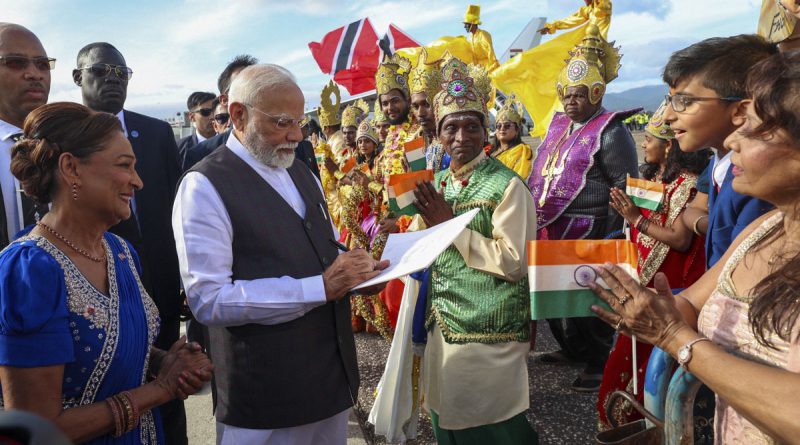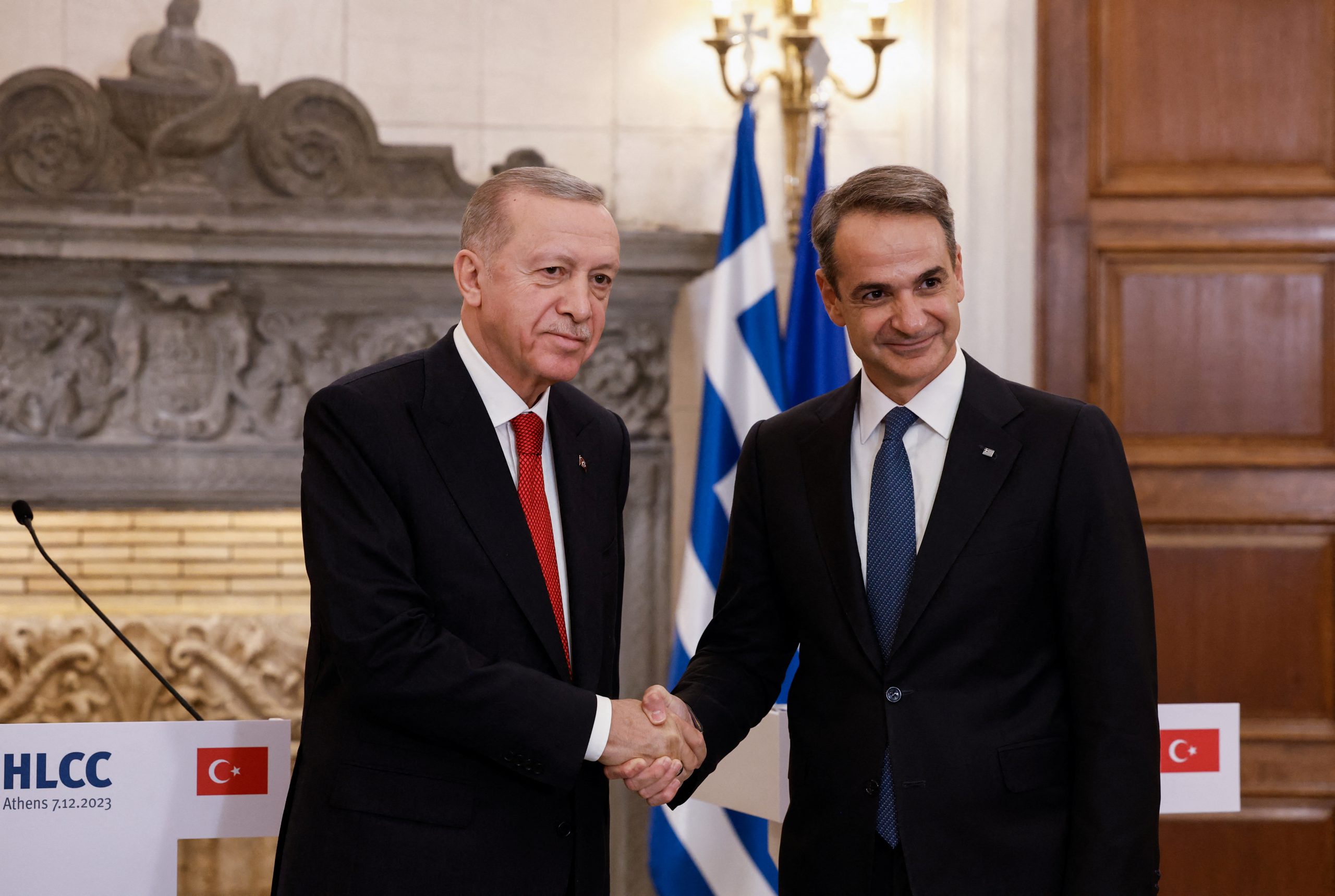OPINION: PM Modi’s Caribbean Homecoming—A Cultural Reunion in Trinidad
Trinidad and Tobago, with its Indian roots and vibrant democracy, is well-placed to serve as a bridge between India and the wider Caribbean.
Arriving at Piarco International Airport, PM Modi received a heartfelt welcome. Trinidad’s Prime Minister, Kamla Persad‑Bissessar, along with her entire cabinet, greeted him in traditional Indian attire, symbolizing the centuries-old cultural links between India and Trinidad and Tobago.
A traditional Guard of Honour stood poised, and the melodies of Bhojpuri Chautaal, a folk song from Bihar, filled the air. For Modi, these were not just ceremonial gestures but living connections between peoples separated by oceans but bound by memory.
The Indian diaspora in Trinidad traces its origins to over 140,000 indentured labourers who arrived between 1845 and 1917. Today, their descendants form nearly 40% of Trinidad’s population. This visit felt like a reunion more than a diplomatic stop.
Girmitiyas: The Founding Pillars of Indo-Trinidadian Heritage
The term “Girmitiya” refers to the Indian indentured laborers who were brought to Trinidad and Tobago between 1845 and 1917 under the British colonial system. These migrants, primarily from Uttar Pradesh and Bihar, signed “girmits” (a mispronunciation of the word “agreement”) to work on sugar plantations, often under harsh and exploitative conditions.
Despite the hardships, the Girmitiyas carried with them a rich cultural heritage, language, music, religion, cuisine, and traditions, that they preserved and adapted in their new homeland. Over generations, they transformed from labourers to leaders, entrepreneurs, and cultural custodians.
Today, the descendants of these Girmitiyas constitute a significant portion of the Trinidadian population and play a vital role in shaping the nation’s social, political, and economic fabric, while maintaining a deep emotional and ancestral connection to India.
“Bihar ki Beti” – Celebrating Shared Identity
One of the most poignant moments came when PM Modi affectionately referred to Trinidad and Tobago’s Prime Minister Kamla Persad‑Bissessar as “Bihar ki Beti”, a daughter of Bihar. Her ancestral roots lie in Buxar, a district in Bihar, India. The phrase drew wide smiles and warm applause, resonating deeply with Indo-Trinidadians whose own family stories mirror hers.
Kamla Persad-Bissessar has made history in many ways, being the first woman to serve as Prime Minister, Attorney General, and Leader of the Opposition in Trinidad and Tobago. Her leadership reflects the success of the Indo-Caribbean community and the integration of Indian culture into the fabric of the Caribbean.
Modi’s greeting was not just affectionate but deeply symbolic, an acknowledgment of shared lineage, identity, and belonging. For many in the Indian diaspora, this was more than a state visit; it was a recognition of their heritage on the global stage.
Another “Bihar ki Beti”, Nutan Ragoobir, a fourth-generation Indo-Trinidadian based in Trinidad & Tobago, both an accomplished insurance consultant and a passionate storyteller of Hindu heritage, In 2019, published her debut book “Bihar & Beyond”, through personal anecdotes, oral histories, and archival research, brings to life the resilience of these early migrants who bore their language, faith, culinary traditions, and rituals across the oceans, and in doing so, became the roots of a thriving Indo-Trinidadian culture.
A Steel of Strategies: Parliament Address & Cricket Humour
On July 4, PM Modi addressed a joint sitting of Trinidad and Tobago’s Parliament. In a speech that blended vision with emotion, he spoke of cooperation between India and Trinidad and Tobago in areas such as health, technology, climate change, and digital development.
He emphasized the shared destiny of the Global South and called for a new global order shaped by values, equality, and mutual respect.
His remark that “Indians are among the most passionate fans of the West Indies cricket team” sparked warm laughter across the parliamentary hall. He added a twist: “Except when India is playing against them!” The audience chuckled, acknowledging that cricket has long been a cultural bridge between the Caribbean and India.
This touch of humor, fused with statesmanship, reflected Modi’s instinctive ability to connect with people, not just policymakers.
Honors & Ceremony: Order of the Republic
The visit’s most defining moment came when PM Modi was awarded the Order of the Republic of Trinidad and Tobago, the country’s highest civilian honour. This made him the first Indian Prime Minister to receive the honour, and it served as a testament to the respect and admiration he commands in the region.
President Christine Kangaloo, who conferred the award, called it “a recognition of Modi’s outstanding contribution to strengthening the bonds between our nations and the Indian diaspora worldwide.”
Modi, in turn, accepted the honour on behalf of 1.4 billion Indians. In his words, “This is not for me as an individual, but for the people of India.” The gesture resonated widely, as it emphasized humility and the collective spirit of a growing nation.
Building Bridges: Trade, Health, Energy
The two leaders held detailed discussions on expanding bilateral cooperation. At the heart of the dialogue was a commitment to human development. Both countries agreed to increase collaboration in:
– Healthcare: Sharing of expertise and telemedicine programs.
– Technology and AI: Capacity-building initiatives and digital connectivity.
– Energy: Particularly renewable energy, a key concern for island nations.
– Education: Exchange programs and scholarships for Caribbean students.
India also proposed support for modernizing infrastructure and improving supply chains through regional connectivity. A joint working group was established to fast-track follow-ups.
The agreements made were not merely transactional but aimed at enhancing people-to-people contact, enabling small businesses, and empowering youth.
Cultural Diplomacy at Dinner: Sohari Leaves & Shared Heritage
During a state banquet, Prime Minister Persad-Bissessar offered a touching tribute to Indo-Trinidadian culture. The menu included meals served on Sohari leaves, a traditional Indian practice still observed in many households. This was more than a culinary decision, it was a cultural salute to ancestors who carried these customs across the oceans more than a century ago.
Guests dined in a hall filled with Indian and Caribbean melodies, and the symbolism was powerful. Here was a dinner that honoured the memory of those who sailed to foreign shores in search of hope, and found a home that kept their traditions alive.
For the diaspora, this was an emotional recognition. For the Indian delegation, it was a powerful reminder of the strength of cultural continuity.
Such is the connect with India and its culture that a Trinidadian, Ms DA, travelling with me to Haridwar, refused an offer of potato chips politely, saying, “Mr Chaubey, I am fasting because I have to meet Ganga Maiyya”.
Resonating with the People: Diaspora Engagement
PM Modi took time to interact with the Indian community in Trinidad, many of whom had traveled from far and wide to witness this historic moment. In a gathering held in Couva, a hub of Indo-Caribbean culture, he spoke from the heart.
“I may be in the Caribbean, but I feel at home,” he said, drawing loud applause. He praised the community for upholding Indian values while also contributing immensely to Trinidadian society.
Children performed Bharatanatyam, and elders sang bhajans, fusing Indian tradition with Caribbean rhythms. It was a deeply emotional event. Tears flowed, not of sadness, but of connection, of a home remembered and a heritage cherished.
Impact & Reflections
A Symbolic Milestone: The visit marked the first bilateral engagement by an Indian Prime Minister to Trinidad and Tobago in over two decades. It affirmed India’s commitment to its diaspora and the Caribbean.
Cultural Soft Power: From Bhojpuri songs to Sohari leaves, from folk music to family stories, the visit reminded the world that diplomacy is not only about deals, it’s also about identity, memory, and belonging.
Strategic Cooperation: The broad range of agreements in digital infrastructure, climate change, education, and healthcare are geared toward sustainable development and long-term partnership.
Diaspora as Diplomacy: Perhaps the most powerful tool of India’s diplomacy in the Caribbean is its diaspora. Modi’s personal outreach was a statement that every Indian, regardless of geography, matters.
Looking Ahead: Beyond Two Days
PM Modi’s Caribbean outreach is part of a broader vision that includes Latin America and Africa. His message to the Caribbean was one of equal partnership, mutual respect, and shared prosperity.
Trinidad and Tobago, with its Indian roots and vibrant democracy, is well-placed to serve as a bridge between India and the wider Caribbean. As global challenges become more complex—climate change, healthcare, cybersecurity—such partnerships become vital.
The visit ended with promises of joint task forces, increased scholarships, business forums, and youth exchanges. But what lingered most was the emotional footprint, of bonds renewed, roots honored, and futures imagined.
Final Thoughts
PM Modi’s visit to Trinidad and Tobago was more than just a diplomatic formality. It was a homecoming for a community and a symbolic embrace of shared histories. For the Indian diaspora, it was recognition of identity. For the government of Trinidad and Tobago, it was a reaffirmation of strategic partnership.
But above all, it was a moment of human connection, something often forgotten in geopolitics, but always remembered by people.
In the embrace of culture, in the laughter over cricket, and in the humble honour of an ancient bond, two nations found something timeless: friendship not forged in treaties, but in tradition.
Disclaimer: Views expressed by writers in this section are their own and do not reflect Milli Chronicle’s point-of-view.



